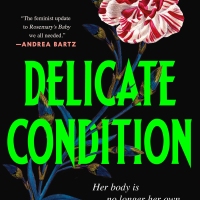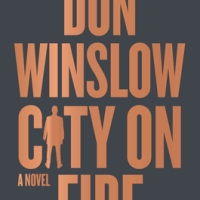Book Review: The Light of the Midnight Stars by Rena Rossner
I received a review copy from the publisher. This does not affect the contents of my review and all opinions are my own.
 The Light of the Midnight Stars by Rena Rossner
The Light of the Midnight Stars by Rena Rossner
Mogsy’s Rating: 3.5 of 5 stars
Genre: Fantasy
Series: Stand Alone
Publisher: Redhook (April 13, 2021)
Length: 432 pages
Author Information: Website | Twitter
Rena Rossner’s debut The Sisters of the Winter Wood was an enchanting read for me, and so when I heard that her sophomore novel will be another historical fantasy and folkloric myth blend, I’d hoped that it would work the same magic. And for the most part, it did! That said, there was also an overwhelming amount of information to take in, and I think that might have had a lot to do with my initial struggle to connect with the story and characters.
The Light of the Midnight Stars follows the lives of three sisters growing up with their rabbi father in the Hungarian village of Trnava. As descendants of King Solomon, their family is well respected by the Jewish community, and the girls are each gifted with a magical ability—Hannah, who has the power to heal and make things grow; Sarah, who can command fire and make things burn; and Levana, who can read the secrets of the stars. However, as superstition runs rampant throughout the rest of the village, bringing religious persecution and fear of witchcraft, the sisters don’t dare to make their abilities known.
But then a mysterious black mist descends upon Trnava, causing people to fall deathly ill. Despite her misgivings, Hannah, the oldest sister, makes a bold decision to use her healing, setting off a tragic chain of events leading to her own heartbreak and the upheaval of the town’s Jewish population. After fleeing Trnava, the rabbi and his family find themselves settling in a new place, protecting themselves by hiding their true faith and identities. Emotionally damaged and traumatized though, the sisters have a long journey ahead of them until they can feel whole and ready to live and love again.
Like I said, there is a lot happening here, and what I’ve provided above is just an extremely truncated synopsis. While the deluge of information made the early parts of the novel slow to take off, I still found myself captivated by many points and took to certain aspects of the story right away. As with The Sisters of the Winter Wood, I was impressed with how Rossner combined magic, myth, and history from her interest and experiences with her own Jewish ancestry. Central to the book is the theme of religious belief and identity, and I feel the author did a wonderful job exploring these topics through the eyes of the three sisters, who are each unique in their own way. Subsequently, they also dealt with their individual conflicts by following their own heart’s desires and motivations, developing along their own paths. As such, it is probably no surprise that characterization was superb.
That said, when it comes to books with an information overload at the beginning, my experience is that things typically tend to ease off as the story progresses, gradually dispelling any feelings of confusion or of being swamped. Except, I don’t know if I really got that with this. In part, this was due to the structure of the novel, which cycled between the sisters’ POVs while weaving in the odd interlude. The tricky part comes, however, as some of these chapters are presented differently, as journal entries or in verse, etc., and the frequent injection of side stories and folktales. In fact, the act of storytelling is a very important concept, a key part of the book’s premise and the myriad legends and historical narratives that inspired its foundations. In a way, this does explain how some mythological motifs would pop up again and again, echoing throughout the characters’ past and present. It’s a clear nod to the importance of the oral tradition in preserving heritage and culture, especially where religious parables and folktales are concerned.
Still, that doesn’t mean the format was all that conducive to the reading experience, or that it made things any easier to understand. The plot doesn’t follow a conventional roadmap, and despite this providing the book with a distinct feel, there were nonetheless sections I found somewhat convoluted and difficult to follow.
In sum, I’m going to reiterate a few of the same conclusions I drew for my review The Sisters of the Winter Wood, because I think a lot of it applies here as well. The Light of the Midnight Stars is beautifully written, but it is also less plot focused, emphasizing the characters and their relationships instead. That along with the irregular structure and flow of the novel means that it’s probably not going to be for everyone, but it’s worth checking out if the story’s description along with its inspiration from Jewish culture and Eastern European history interests you.
![]()
![]()












I hope to read that one as the publisher contacted me. I know now to expect it to be slow…😉 Excellent review!
LikeLike
It’s slow, but it builds nicely. I hope you’ll enjoy it!
LikeLike
Hmm I wonder about this one
LikeLiked by 1 person
The story sounds fascinating, indeed, although your description of the delivery makes me think it would require some patience and certainly greater attention than other works: still, knowing this beforehand might prove more than helpful to “navigate” through these obstacles 🙂
Thanks for sharing!
LikeLike
Yeah, it’s a uniquely structured story, but it’s easier to get into once you are fully immersed!
LikeLiked by 1 person
Thanks for the review, Mogsy. I might give The Sisters of the Winter Wood a go.
LikeLiked by 1 person
I liked that one slightly better – a good one if you’re into fairy tale/folklore stories!
LikeLiked by 1 person
I’m curious to see how I will like this, but if its similar in feel to her first book, I will most likely enjoy it. But since I’m reading April releases in the order I want to read them, I’m not sure when this will come up on the pile…
LikeLike
It’s similar in feel to the first book, with slightly more focus on the characters over the myths – I hope you’ll enjoy it if you get to it!
LikeLike
I’m sorry you didn’t enjoy this novel, but you made some good points about how and why you felt that way. Great review.
LikeLike
I didn’t dislike it, but I think certain structural elements/format choices made it tougher to get into.
LikeLiked by 1 person
I don’t recall reading any fantasy that include aspects of Jewish culture and history, so that has me intrigued.
LikeLike
Her first book also has elements of Jewish culture and history, so check that one out too if you’re interested 😀
LikeLike
This cover is just so pretty! Oo sorry to hear it is less plot focused. I tend to like a good amount of plot movement when I’m reading books.
LikeLike
The cover definitely is gorgeous! I too need a strong plot to stay focused, but I did like how developed the characters were in this.
LikeLiked by 1 person
Developed characters are great!
LikeLike
I do like the sound of it
LikeLiked by 1 person
Pingback: Bookshelf Roundup: 04/17/21: Stacking the Shelves & Recent Reads | The BiblioSanctum
I did start this one but found myself struggling so put it down for now. Maybe it’s just my current reading mood.
Lynn 😀
LikeLike
Pingback: Book Highlight: The Light of the Midnight Stars by Rena Rossner – The Lily Cafe